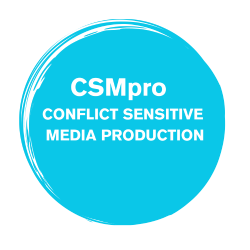Should Journalists Advocate For Peace? A Dilemma.
Writer: Sanchita Maharjan
This article is a synthesis of two episodes from the podcast series “Conflict Sensitive Journalism,” hosted by Björn Eser – the Peacebuilding Practitioner, and featuring Antonia Kopp, an esteemed journalist with extensive experience in conflict-affected regions, particularly the Middle East and Southeast Asia. The podcast delves into the intricate interplay between conflict-sensitive journalism and the endeavors of peacebuilders, underscoring the pivotal role media plays in shaping perceptions during times of conflict. The discourse springs from the growing realization of how media reporting can profoundly impact conflicts, giving rise to concepts like peace journalism and conflict-sensitive journalism.
Journalism is frequently praised as a cornerstone of democracy, serving as the medium for providing citizens with essential information and insights into issues that affect society. It occupies a critical position in shaping public understanding and fostering platforms for open dialogue. Within the realm of professional journalism, the ‘Discursive Journalism’ Model upholds the values of impartiality and accuracy in reporting. While advocacy within journalism is acknowledged as significant, it can blur the line between objective reporting and advancing personal agendas. Journalists shoulder the responsibility of offering factual, non-partisan information to empower informed decision-making by the public. For the sake of maintaining peace, it is imperative for journalists to uphold impartiality and present the truth without bias, as advocacy can restrict people’s choices, manipulate information, and erode freedom and choice. The role of publicly funded media is underscored as invaluable in preserving high-quality journalism. In contrast, privately owned media organizations may carry their own agendas, necessitating vigilance from both journalists and society to safeguard the integrity of journalism.
In summary, while advocating for peace is an admirable goal, journalists must draw a fine line between championing worthy causes and fulfilling their primary role as impartial conveyors of news. Although the ideals proposed may seem noble, an earnest plea exists for journalists and media organizations to continuously strive for better journalism that upholds the pillars of democracy, human rights, and peace. It is firmly believed that when individuals comprehend the consequences of war and recognize the presence of viable alternatives, the inclination towards actively choosing war diminishes significantly.
The ethical dilemmas journalists face when attempting to balance objectivity with the responsibility to report on human rights abuses, violence, or injustices during conflicts are substantial and of profound consideration. Discussions regarding how journalists navigate these ethical challenges could prove invaluable. While the article emphasizes the role of journalism in providing information to citizens, the responsibility lies upon journalists to also promote media literacy and critical thinking among their audiences. Addressing how journalists can aid the public in distinguishing credible sources from misinformation and propaganda would undoubtedly be beneficial.
Journalism’s core values are rooted in objectivity and impartiality. When journalists adopt the role of advocates for peace, maintaining these principles can be a formidable task. Advocacy often necessitates taking a stance or espousing a particular viewpoint, which can compromise a journalist’s capacity to provide balanced and unbiased coverage. This can engender doubts regarding the credibility and trustworthiness of their reporting.
Many conflicts are multifaceted and deeply entrenched in intricate historical, political, and social contexts. Advocating for peace may oversimplify these conflicts, making it tough to accurately report. Striking a harmonious balance between advocating for peace and delivering comprehensive, context-rich coverage is a challenge that journalists continually grapple with.
The challenge of journalists advocating for peace lies in the tension between advocacy and the journalistic principles of neutrality, fairness, and accuracy. Discovering an equilibrium that enables journalists to promote peace while upholding their ethical and professional obligations remains a complex and ongoing challenge. The article underscores the significance of impartiality in journalism while acknowledging that complete impartiality can be indescribable, sparking conversations about the ethics of advocacy in journalism and where the boundaries should be delineated between reporting with a clear agenda and preserving objectivity.
